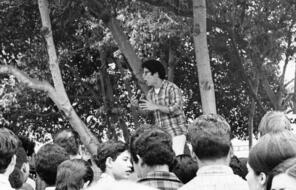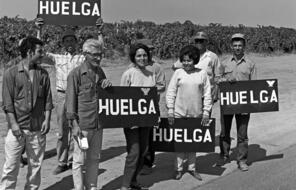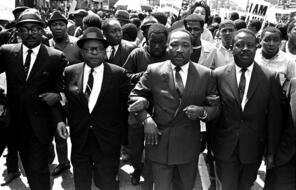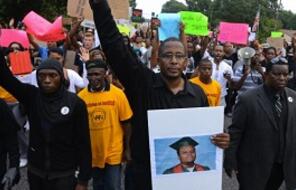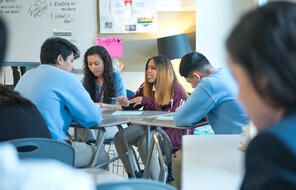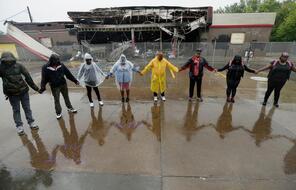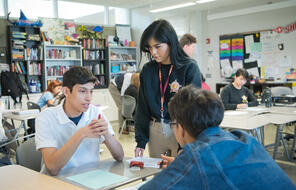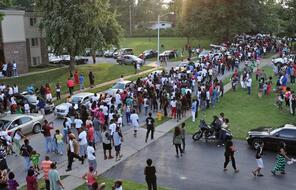African Identities
At a Glance
Language
English — USSubject
- History
- Social Studies
- Democracy & Civic Engagement
Nelson Mandela, born in 1918, came from a proud family and a cultural tradition that the dominant white South African society often denigrated. As a student, Mandela attended the missionary school Healdtown, located within the Xhosa region but accepting students from throughout the country. The teaching was in English, and the curriculum focused on European themes. Here, Mandela recalls a transformative experience at school that helped him begin to question his identity and consider a broader one.
In my final year at Healdtown [1937], an event occurred that for me was like a comet streaking across the night sky. Toward the end of the year, we were informed that the great Xhosa poet Krune Mqhayi was going to visit the school. Mqhayi was actually an imbongi, a praise-singer, a kind of oral historian who marks contemporary events and history with poetry that is of special meaning to his people.
The day of his visit was declared a holiday by the school authorities. On the appointed morning, the entire school, including staff members both black and white, gathered in the dining hall, which was where we held school assemblies. There was a stage at one end of the hall and on it a door that led to [headmaster] Dr. Wellington's house. The door itself was nothing special, but we thought of it as Dr. Wellington's door, for no one ever walked through it except Dr. Wellington himself. Suddenly, the door opened and out walked not Dr. Wellington, but a black man dressed in a leopard-skin kaross [cloak made of animal hide] and matching hat, who was carrying a spear in either hand. Dr. Wellington followed a moment later, but the sight of a black man in tribal dress coming through that door was electrifying. It is hard to explain the impact it had on us. It seemed to turn the universe upside down...
At one point, he raised his assegai [spear] into the air for emphasis and accidentally hit the curtain wire above him, which made a sharp noise and caused the curtain to sway. The poet looked at the point of his spear and then the curtain wire and, deep in thought, walked back and forth across the stage. After a minute, he stopped walking, faced us, and, newly energized, exclaimed that this incident—the assegai striking the wire—symbolized the clash between the culture of Africa and that of Europe. His voice rose and he said, "The assegai stands for what is glorious and true in African history; it is a symbol of the African as warrior and the African as artist. This metal wire,” he said, pointing above, “is an example of Western manufacturing, which is skillful but cold, clever but soulless...I predict that one day, the forces of African society will achieve a momentous victory over the interloper. For too long, we have succumbed to the false gods of the white man. But we will emerge and cast off these foreign notions.”
I could hardly believe my ears...
Mqhayi then began to recite his well-known poem in which he apportions the stars in the heavens to the various nations of the world. Roving the stage and gesturing with his assegai toward the sky, he said that to the people of Europe—the French, the Germans, the English—"I give you the Milky Way, the largest constellation, for you are a strange people, full of greed and envy, who quarrel over plenty."
...He then discussed Africa and separated the continent into different nations, giving specific constellations to different tribes. He had been dancing about the stage, waving his spear, modulating his voice, and now suddenly he became still, and lowered his voice.
"Now, come you, O House of Xhosa," he said, and slowly began to lower himself so that he was on one knee. "I give unto you the most important and transcendent star, the Morning Star, for you are a proud and powerful people. It is the star for counting the years—the years of manhood.” When he spoke this last word, he dropped his head to his chest. We rose to our feet, clapping and cheering.
I was galvanized, but also confused by Mqhayi's performance. He had moved from a more nationalistic, all-encompassing theme of African unity to a more parochial one addressed to the Xhosa people, of whom he was one. As my time at Healdtown was coming to an end, I had many new and sometimes conflicting ideas floating in my head...In a sense, Mqhayi's shift in focus was a mirror of my own mind because I went back and forth between pride in myself as a Xhosa and a feeling of kinship with other Africans. But as I left Healdtown at the end of the year, I saw myself as a Xhosa first and an African second. 1
- 1Nelson Mandela, The Illustrated Long Walk to Freedom (London: Little, Brown, 2008), 43–48. Reproduced by permission of Little, Brown and Company, an imprint of Hachette Book Group, Inc.
Additional Readings on Nelson Mandela
Connection Questions
- Mandela writes that the poet’s visit was “like a comet streaking across the sky.” What shocked Mandela about this visit and performance?
- What did the poet condemn about European culture? What did he admire about African culture? Is it possible to be proud of your group and its culture and traditions without diminishing the traditions of others? Where is the line between pride in yourself and your group and prejudice toward others?
- As Mandela was finishing his last year at boarding school, how did he understand his identity? What confused him about it and why?
How to Cite This Reading
Facing History & Ourselves, “African Identities,” last updated July 31, 2018.
This reading contains text not authored by Facing History & Ourselves. See footnotes for source information.



